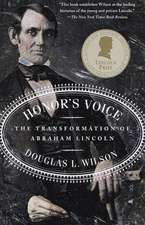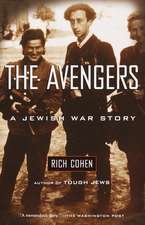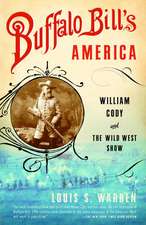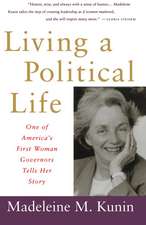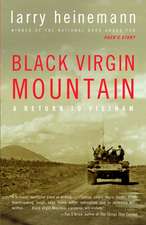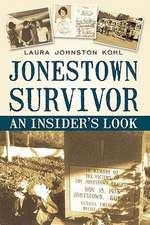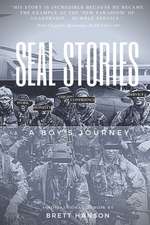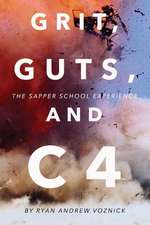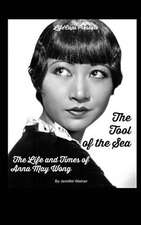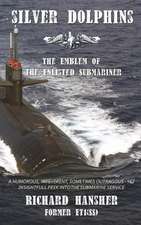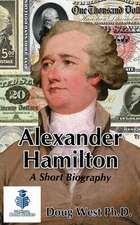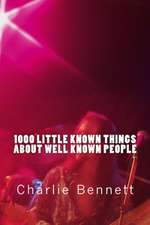Soldier: The Life of Colin Powell
Autor Karen DeYoungen Limba Engleză Paperback – 31 oct 2007
Over the course of a lifetime of service to his country, Colin Powell became a national hero, a beacon of wise leadership and one of the most trusted political figures in America. In Soldier, the award-winning Washington Post editor Karen DeYoung takes us from Powell’s humble roots as the son of Jamaican immigrants to his meteoric rise through the military ranks during the Cold War and Desert Storm to his agonizing deliberations over whether to run for president. Culminating in his stint as Secretary of State in the Bush Administration and his role in making the case for war with Iraq, this is a sympathetic but objective portrait of a great but fallible man.
Preț: 135.88 lei
Nou
Puncte Express: 204
Preț estimativ în valută:
26.00€ • 27.05$ • 21.47£
26.00€ • 27.05$ • 21.47£
Carte disponibilă
Livrare economică 25 martie-08 aprilie
Preluare comenzi: 021 569.72.76
Specificații
ISBN-13: 9781400075645
ISBN-10: 1400075645
Pagini: 612
Ilustrații: 16 PP. B&W
Dimensiuni: 162 x 231 x 32 mm
Greutate: 0.8 kg
Editura: Vintage Books USA
ISBN-10: 1400075645
Pagini: 612
Ilustrații: 16 PP. B&W
Dimensiuni: 162 x 231 x 32 mm
Greutate: 0.8 kg
Editura: Vintage Books USA
Notă biografică
Karen DeYoung has worked at The Washington Post since 1975. She has held a number of positions, including her current slot as associate editor. She also has served as assistant managing editor for national news, national editor, London bureau chief, foreign editor, and Latin America bureau chief. She has won a number of awards, including the 2003 Edward Weintal Award for Diplomatic Reporting, Sigma Delta Chi awards for investigative reporting and foreign reporting, and a Pulitzer Prize she shared with several Washington Post colleagues for national coverage of the war on terrorism. She lives in the D.C. area, with her husband and two children.
Extras
from Chapter 19
When Adolfo Aguilar Zinser walked into the Security Council on Wednesday morning, the first things he noticed were the video screens and computers that had been installed for Powell’s multimedia presentation. It was a sure sign, Mexico’s U.N. ambassador thought with some disdain, that “this show wasn’t for us. It was for an international audience, for the U.S. media.”
Outside, New York City police officers directed limousine convoys through the high iron gates and onto the circular U.N. driveway, where they deposited arriving foreign ministers and dignitaries. Television satellite trucks were lined up wheel to wheel along First Avenue, and reporters stood shivering in the icy February wind as they shouted into handheld microphones.
The speech was being broadcast live around the world, but a long line of spectators, hoping to watch history being made firsthand, snaked through a white security tent. Every seat in the visitors’ gallery was filled when Powell entered the chamber just before 10:30 a.m., smiling and stopping to shake hands as he made his way across the floor. By the time he took his chair at the horseshoe-shaped Council table at the center of the room, with Tenet seated behind his right shoulder and Negroponte behind his left, his features were composed in a mask of gravity.
With war hanging in the balance and the power and prestige of the United States on full display, it was a moment of high drama that owed as much to the player as to the play. A nationwide poll released just that morning had found that “when it comes to U.S. policy toward Iraq,” Americans trusted Powell more than Bush by a margin of 63 to 24 percent. His reputation as the “reluctant warrior” and as the administration’s leading dove—arguably its only one—would lend incalculable credibility to the case he was about to make.
“I cannot tell you everything that we know,” he began after a brief introduction. “But what I can share with you, when combined with what all of us have learned over the years, is deeply troubling.” The facts and Iraq’s behavior “demonstrate that Saddam Hussein and his regime have made no effort—no effort—to disarm as required by the international community.” He moved quickly into his first demonstration, an audiotape of two Iraqi officers he said were discussing the concealment of a “modified vehicle” on November 26, 2002, the day before inspections began. As the scratchy Arabic words echoed through the chamber, an English translation appeared on the video screen.
“My colleagues,” Powell said, “every statement I make today is backed up by sources, solid sources. These are not assertions. What we are giving you are facts and conclusions based on solid intelligence.”
For an hour and fifteen minutes, he condemned what he called Saddam Hussein’s efforts to conceal and to lie about his weapons programs. He played more tapes, showed satellite photographs and displayed artists’ renderings of the mobile biological weapons labs he said had been described in detail by eyewitnesses. He showed a picture of an aluminum tube he said had been intercepted in an Iraq-bound shipment and of the wooden crate it had been packed in. He held up a small vial of white powder—fake poison that had been carried to New York in Boucher’s pocket. “Less than a teaspoon of dry anthrax . . . about this amount . . . shut down the United States Senate in the fall of 2001” when it arrived in an anonymous envelope, he said. Although there had been little suggestion of Iraqi involvement at the time, Powell implied a connection, saying that Iraq had never accounted for 25,000 liters of anthrax that U.N. inspectors in the 1990s estimated it had retained. It was enough, he said, for “tens upon tens of thousands of teaspoons.”
He spoke of the “sinister nexus between Iraq and the al Qaeda network, a nexus that combines classic terrorist organizations and modern methods of murder.” Saddam was currently harboring a “deadly terrorist network headed by Abu Musab al Zarqawi, an associate and collaborator of Osama bin Laden and his al Qaeda lieutenants.” In far more detail than any administration official had offered publicly to date, he described Iraqi training of al-Qaeda operatives in chemical and biological weapons production, attributing the information to a “senior terrorist operative” now in U.S. custody.
“Some believe, some claim, these contacts do not amount to much,” he said. “They say Saddam Hussein’s secular tyranny and al Qaeda’s religious tyranny do not mix. I am not comforted by this thought.”
The foreign ministers and other officials around the table were silent. Iraqi Ambassador Mohamed Al-Douri furiously scribbled notes. Kofi Annan sat pensively, making steeples of his long fingers. Joschka Fischer twiddled with his pen, drummed his fingers and cleaned his glasses. Dominique de Villepin leaned forward and stared at Powell intently while Jack Straw nodded his head in agreement.
“We know that Saddam Hussein is determined to keep his weapons of mass destruction, is determined to make more,” Powell said in closing. “Given Saddam Hussein’s history of aggression, given what we know of his grandiose plans, given what we know of his terrorist associations and given his determination to exact revenge on those who oppose him, should we take the risk that he will not some day use these weapons at a time and a place and in a manner of his choosing, at a time when the world is in a much weaker position to respond?
“The United States will not and cannot run that risk for the American people.” The Security Council, in Resolution 1441, had given Iraq one last chance, he said. “Iraq is not, so far, taking that one last chance. We must not shrink from whatever is ahead of us. We must not fail in our duty and our responsibility to the citizens of the countries that are represented by this body.”
The other ministers followed his presentation with statements of their own, most of which seemed to have been prepared before Powell spoke. None appeared to have changed his or her views in light of Powell’s revelations.
Chinese Foreign Minister Tang Jiaxuan said he hoped that any country that possessed evidence would turn it over to the inspectors and called for the “utmost effort” to work toward a political solution. Igor Ivanov agreed and said that Powell’s information had provided more, not less, impetus to continue inspections. De Villepin noted that there were still “grey areas” in Iraq’s cooperation with inspectors, a good reason to increase the number of U.N. personnel on the ground.
Much of the world seemed similarly underwhelmed. British reaction was divided, with conservative commentators agreeing that Powell had proven the case for war, while liberal ones, along with the majority of the population, remained doubtful. Among Iraq’s neighbors, The Jordan Times said that “these new elements did not amount to convincing evidence of Iraqi noncompliance, or that Iraq presents any real or imminent danger to any party.” But an editorial in Israel’s conservative Jerusalem Post exulted, “Scratch everything we’ve said about Secretary of State Colin Powell. We love him.”
Saddam Hussein told Tony Benn, a visiting British member of Parliament, “[t]here is only one truth. . . . As I have said on many occasions before . . . Iraq has no weapons of mass destruction whatsoever.”
But if world opinion largely rejected Powell’s argument as a justification for war, his speech was an overwhelming success at home. U.S. public opinion shifted literally overnight to support for dealing forcefully with Iraq. A Newsweek poll taken just after the speech found that half of all Americans surveyed were now ready to go to war, compared to only a third the previous month. Three out of four Americans who told Los Angeles Times pollsters that they had watched, listened to or heard about Powell’s presentation said that the United States had proved its case against Iraq.
A Washington Post editorial called the evidence “irrefutable” and said that Powell’s case made it “hard to imagine how anyone could doubt that Iraq possesses weapons of mass destruction.” Even the war-wary New York Times said that Powell had made “the most powerful case to date that Saddam Hussein stands in defiance of Security Council resolutions and has no intention of revealing or surrendering whatever unconventional weapons he may have.” Mary McGrory, the grande dame of liberal political columnists and one of the harshest critics of the administration’s hawkish stance, said she had been persuaded. “I’m not ready for war yet,” McGrory wrote. “But Colin Powell has convinced me that it might be the only way to stop a fiend, and that if we do go, there is a reason.”
Republican politicians were euphoric, and many previously skeptical Democrats said they had been convinced. Senate Minority Leader Tom Daschle of South Dakota called the speech “a powerful, methodical and compelling presentation,” and California Democratic Senator Dianne Feinstein, who had expressed strong doubts about the allegations made in Bush’s State of the Union address, now conceded that “I no longer think inspections are going to work.” “If Saddam Hussein does not disarm,” said Massachusetts Senator John F. Kerry, now a Democratic presidential contender, “he will have chosen to make regime change the ultimate weapons
enforcement mechanism.”
Powell received high praise when he appeared before the Senate Foreign Relations Committee the day after the speech to testify on the State Department budget. “I’d like to move the nomination of Secretary of State Powell for President of the United States,” Democrat Joseph Biden gushed.
It fell to a Republican to bring the love fest back to earth. “Easy there,” said Richard Lugar of Indiana, the committee chairman, admonishing Biden with a smile.
Although a majority of congressional Democrats closed ranks behind the president, some still spoke out against the push toward war. Senator Edward Kennedy of Massachusetts conceded that Powell had made a “strong case” but said the administration had not yet demonstrated that “war is the only recourse.” Former Vermont Governor Howard Dean agreed, saying he had heard little from Powell “that leads me to believe that there is an imminent threat warranting unilateral military action by the United States against Iraq.”
Those closest to Powell were glad it was all over but were worried about both him and the nation. Alma had a sense of foreboding; her husband, she thought, was being used by the White House. Colin’s daughter Linda listened to the speech on the car radio as she drove from New York to Vermont. She had heard her father speak in public countless times but found this performance unsettling. His voice was strained, she thought, as if he were trying to inject passion into the dry words through the sheer force of his will.
Wilkerson, who had left the United Nations immediately after the speech and returned to his hotel room to fall into a deep sleep, awoke depressed. He would later come to think of that week, and its dramatic culmination, as “the lowest moment of my life.” Back in Washington, he ordered special plaques with Powell’s signature made up for the State Department aides who had worked so hard to make the presentation happen. When they were handed out, Powell asked Wilkerson why he hadn’t ordered one for himself. Wilkerson replied that he didn’t want one.
From the Hardcover edition.
When Adolfo Aguilar Zinser walked into the Security Council on Wednesday morning, the first things he noticed were the video screens and computers that had been installed for Powell’s multimedia presentation. It was a sure sign, Mexico’s U.N. ambassador thought with some disdain, that “this show wasn’t for us. It was for an international audience, for the U.S. media.”
Outside, New York City police officers directed limousine convoys through the high iron gates and onto the circular U.N. driveway, where they deposited arriving foreign ministers and dignitaries. Television satellite trucks were lined up wheel to wheel along First Avenue, and reporters stood shivering in the icy February wind as they shouted into handheld microphones.
The speech was being broadcast live around the world, but a long line of spectators, hoping to watch history being made firsthand, snaked through a white security tent. Every seat in the visitors’ gallery was filled when Powell entered the chamber just before 10:30 a.m., smiling and stopping to shake hands as he made his way across the floor. By the time he took his chair at the horseshoe-shaped Council table at the center of the room, with Tenet seated behind his right shoulder and Negroponte behind his left, his features were composed in a mask of gravity.
With war hanging in the balance and the power and prestige of the United States on full display, it was a moment of high drama that owed as much to the player as to the play. A nationwide poll released just that morning had found that “when it comes to U.S. policy toward Iraq,” Americans trusted Powell more than Bush by a margin of 63 to 24 percent. His reputation as the “reluctant warrior” and as the administration’s leading dove—arguably its only one—would lend incalculable credibility to the case he was about to make.
“I cannot tell you everything that we know,” he began after a brief introduction. “But what I can share with you, when combined with what all of us have learned over the years, is deeply troubling.” The facts and Iraq’s behavior “demonstrate that Saddam Hussein and his regime have made no effort—no effort—to disarm as required by the international community.” He moved quickly into his first demonstration, an audiotape of two Iraqi officers he said were discussing the concealment of a “modified vehicle” on November 26, 2002, the day before inspections began. As the scratchy Arabic words echoed through the chamber, an English translation appeared on the video screen.
“My colleagues,” Powell said, “every statement I make today is backed up by sources, solid sources. These are not assertions. What we are giving you are facts and conclusions based on solid intelligence.”
For an hour and fifteen minutes, he condemned what he called Saddam Hussein’s efforts to conceal and to lie about his weapons programs. He played more tapes, showed satellite photographs and displayed artists’ renderings of the mobile biological weapons labs he said had been described in detail by eyewitnesses. He showed a picture of an aluminum tube he said had been intercepted in an Iraq-bound shipment and of the wooden crate it had been packed in. He held up a small vial of white powder—fake poison that had been carried to New York in Boucher’s pocket. “Less than a teaspoon of dry anthrax . . . about this amount . . . shut down the United States Senate in the fall of 2001” when it arrived in an anonymous envelope, he said. Although there had been little suggestion of Iraqi involvement at the time, Powell implied a connection, saying that Iraq had never accounted for 25,000 liters of anthrax that U.N. inspectors in the 1990s estimated it had retained. It was enough, he said, for “tens upon tens of thousands of teaspoons.”
He spoke of the “sinister nexus between Iraq and the al Qaeda network, a nexus that combines classic terrorist organizations and modern methods of murder.” Saddam was currently harboring a “deadly terrorist network headed by Abu Musab al Zarqawi, an associate and collaborator of Osama bin Laden and his al Qaeda lieutenants.” In far more detail than any administration official had offered publicly to date, he described Iraqi training of al-Qaeda operatives in chemical and biological weapons production, attributing the information to a “senior terrorist operative” now in U.S. custody.
“Some believe, some claim, these contacts do not amount to much,” he said. “They say Saddam Hussein’s secular tyranny and al Qaeda’s religious tyranny do not mix. I am not comforted by this thought.”
The foreign ministers and other officials around the table were silent. Iraqi Ambassador Mohamed Al-Douri furiously scribbled notes. Kofi Annan sat pensively, making steeples of his long fingers. Joschka Fischer twiddled with his pen, drummed his fingers and cleaned his glasses. Dominique de Villepin leaned forward and stared at Powell intently while Jack Straw nodded his head in agreement.
“We know that Saddam Hussein is determined to keep his weapons of mass destruction, is determined to make more,” Powell said in closing. “Given Saddam Hussein’s history of aggression, given what we know of his grandiose plans, given what we know of his terrorist associations and given his determination to exact revenge on those who oppose him, should we take the risk that he will not some day use these weapons at a time and a place and in a manner of his choosing, at a time when the world is in a much weaker position to respond?
“The United States will not and cannot run that risk for the American people.” The Security Council, in Resolution 1441, had given Iraq one last chance, he said. “Iraq is not, so far, taking that one last chance. We must not shrink from whatever is ahead of us. We must not fail in our duty and our responsibility to the citizens of the countries that are represented by this body.”
The other ministers followed his presentation with statements of their own, most of which seemed to have been prepared before Powell spoke. None appeared to have changed his or her views in light of Powell’s revelations.
Chinese Foreign Minister Tang Jiaxuan said he hoped that any country that possessed evidence would turn it over to the inspectors and called for the “utmost effort” to work toward a political solution. Igor Ivanov agreed and said that Powell’s information had provided more, not less, impetus to continue inspections. De Villepin noted that there were still “grey areas” in Iraq’s cooperation with inspectors, a good reason to increase the number of U.N. personnel on the ground.
Much of the world seemed similarly underwhelmed. British reaction was divided, with conservative commentators agreeing that Powell had proven the case for war, while liberal ones, along with the majority of the population, remained doubtful. Among Iraq’s neighbors, The Jordan Times said that “these new elements did not amount to convincing evidence of Iraqi noncompliance, or that Iraq presents any real or imminent danger to any party.” But an editorial in Israel’s conservative Jerusalem Post exulted, “Scratch everything we’ve said about Secretary of State Colin Powell. We love him.”
Saddam Hussein told Tony Benn, a visiting British member of Parliament, “[t]here is only one truth. . . . As I have said on many occasions before . . . Iraq has no weapons of mass destruction whatsoever.”
But if world opinion largely rejected Powell’s argument as a justification for war, his speech was an overwhelming success at home. U.S. public opinion shifted literally overnight to support for dealing forcefully with Iraq. A Newsweek poll taken just after the speech found that half of all Americans surveyed were now ready to go to war, compared to only a third the previous month. Three out of four Americans who told Los Angeles Times pollsters that they had watched, listened to or heard about Powell’s presentation said that the United States had proved its case against Iraq.
A Washington Post editorial called the evidence “irrefutable” and said that Powell’s case made it “hard to imagine how anyone could doubt that Iraq possesses weapons of mass destruction.” Even the war-wary New York Times said that Powell had made “the most powerful case to date that Saddam Hussein stands in defiance of Security Council resolutions and has no intention of revealing or surrendering whatever unconventional weapons he may have.” Mary McGrory, the grande dame of liberal political columnists and one of the harshest critics of the administration’s hawkish stance, said she had been persuaded. “I’m not ready for war yet,” McGrory wrote. “But Colin Powell has convinced me that it might be the only way to stop a fiend, and that if we do go, there is a reason.”
Republican politicians were euphoric, and many previously skeptical Democrats said they had been convinced. Senate Minority Leader Tom Daschle of South Dakota called the speech “a powerful, methodical and compelling presentation,” and California Democratic Senator Dianne Feinstein, who had expressed strong doubts about the allegations made in Bush’s State of the Union address, now conceded that “I no longer think inspections are going to work.” “If Saddam Hussein does not disarm,” said Massachusetts Senator John F. Kerry, now a Democratic presidential contender, “he will have chosen to make regime change the ultimate weapons
enforcement mechanism.”
Powell received high praise when he appeared before the Senate Foreign Relations Committee the day after the speech to testify on the State Department budget. “I’d like to move the nomination of Secretary of State Powell for President of the United States,” Democrat Joseph Biden gushed.
It fell to a Republican to bring the love fest back to earth. “Easy there,” said Richard Lugar of Indiana, the committee chairman, admonishing Biden with a smile.
Although a majority of congressional Democrats closed ranks behind the president, some still spoke out against the push toward war. Senator Edward Kennedy of Massachusetts conceded that Powell had made a “strong case” but said the administration had not yet demonstrated that “war is the only recourse.” Former Vermont Governor Howard Dean agreed, saying he had heard little from Powell “that leads me to believe that there is an imminent threat warranting unilateral military action by the United States against Iraq.”
Those closest to Powell were glad it was all over but were worried about both him and the nation. Alma had a sense of foreboding; her husband, she thought, was being used by the White House. Colin’s daughter Linda listened to the speech on the car radio as she drove from New York to Vermont. She had heard her father speak in public countless times but found this performance unsettling. His voice was strained, she thought, as if he were trying to inject passion into the dry words through the sheer force of his will.
Wilkerson, who had left the United Nations immediately after the speech and returned to his hotel room to fall into a deep sleep, awoke depressed. He would later come to think of that week, and its dramatic culmination, as “the lowest moment of my life.” Back in Washington, he ordered special plaques with Powell’s signature made up for the State Department aides who had worked so hard to make the presentation happen. When they were handed out, Powell asked Wilkerson why he hadn’t ordered one for himself. Wilkerson replied that he didn’t want one.
From the Hardcover edition.
Recenzii
“DeYoung’s written a portrait of Powell that is as revealing as it can be and remain flattering, and as flattering as it can be and remain revealing. And she's written it very well.”—The New York Times“Diligent, sympathetic, but not uncritical. . . . It doesn’t pull punches.” —The New York Review of Books“A fascinating study in bureaucratic maneuvering, groupthink and subtle self-deception.” —The Washington Post Book World“Judicious, thorough, unstinting . . . with its privileged glimpses into policy battles and high-level backbiting in the Bush administration, [Soldier] is sure to be one of this year’s top newsmaking books.”—The Dallas Morning News
Descriere
Award-winning "Washington Post" editor DeYoung takes readers from Colin Powell's humble roots as the son of Jamaican immigrants to his meteoric rise through the military ranks. DeYoung presents a sympathetic but objective portrait of a great but fallible man.

